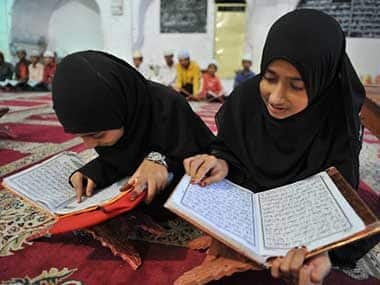What is the reason for the poor representation of Muslims in India’s civil services? The community’s leaders say this is because of prejudice against them. That their access to the professions is deliberately blocked because of their faith. On the side of politics, the Communists and the Congress accept the data on poor Muslim representation, though they do not publicly articulate the reasons for this. They want to redress it through legislation and such things as reservation. The Bharatiya Janata Party does not refer to the data for the most part. To the extent that they accept it, the party’s leaders say that all Indians must be treated alike by the state. To see some as disadvantaged is incorrect, in this view, and everyone will benefit the same if the state is neutral and competent. [caption id=“attachment_135979” align=“alignleft” width=“380”]  Muslim girls are not encouraged to attempt the civil service examinations. Representational image. AFP[/caption] I have speculated in the past that one reason for the backwardness of Muslims is the castes that Muslims are drawn from. Most of the sub-continent’s Muslims are converts from the peasantry and the lower castes. Even among Hindus, these communities have poor representation in the professions because, according to me, of their culture. An article in the current issue of Economic & Political Weekly, possibly India’s finest publication, looks at it another way. Written by the former chairperson of Aligarh Muslim University’s Economics department, it analyses the data of applicants to the civil services from select colleges. The author, Naseem A Zaidi, starts by framing the problem. In the announcement of 3 May, 2013, “out of the 998 candidates recommended (for selection) for various services, only 28 were Muslim – 2.8% of the total. This story is repeated year after year and crossing the 3% barrier seems insurmountable.” Zaidi writes that “Different explanations are proffered for this state of affairs. Among these are: there is something wrong with the sys- tem of selection; it is an evil design of the people in power to keep the second largest community of the country back-ward by depriving them of a fair share in the corridors of power and so on. The Muslim political leadership revels in the opportunity to demand community-based reservations in education and employment in the public services.” Zaidi’s approach is to look at the applicants and see how many are Muslim and how many succeed. Here there is a problem, which is: “While (the Union Public Service Commission reports) carry detailed profiles of candidates belonging to the scheduled castes (SCs), scheduled tribes (STs), Other Backward Classes (OBCs) and the general category, no separate data is available for Muslims.” What Zaidi has therefore done is to look at institution-wise university data on applicants. She chooses two sets of universities. The first includes Aligarh Muslim University, Jamia Millia Islamia, Jammu & Kashmir University and Kerala’s Calicut University “as these are considered hubs for Muslim students.” The second group has Allahabad University, Lucknow University, Banaras Hindu University and the University of Rajasthan, Jaipur. She looks at data for five years and finds that the success ratio of applicants from the Muslim set is actually higher (10.2 per cent of applicants) than that of the general set (4.3 per cent). She then looks at the number of candidates from these institutions that actually appeared for the exams and finds a solution to the problem there. The average annual number of applicants for the four Muslim-dominated institutions is under 25. For the other set it is over 444. Her conclusion is unambiguous: “The low level of participation of Muslim students in the CS examinations rather than their probability of being selected is the major cause for low representation of Muslims in these services.” Zaidi adds her understanding of a second factor that inhibits Muslim participation, which is that “Muslim girls are performing well in many areas but they are not encouraged to attempt the CS examinations.” I think Muslim groups must look at her work in this field and try and see how to improve their community’s position. Some years ago I read the interview of a successful Muslim bureaucrat who had retired. His advice to Muslims in India’s professions was that “there will be not many who will go out of their way to help you. And there will be even fewer who will deliberately want to hinder you. It is up to you to make a success or failure of your career.” I think that is the right way of looking at it.
Muslim groups must study this data on participation of the community’s young men and women in the civil service exams and see how to improve their position.
Advertisement
End of Article
Written by Aakar Patel
Aakar Patel is a writer and columnist. He is a former newspaper editor, having worked with the Bhaskar Group and Mid Day Multimedia Ltd. see more


)
)
)
)
)
)
)
)
)



